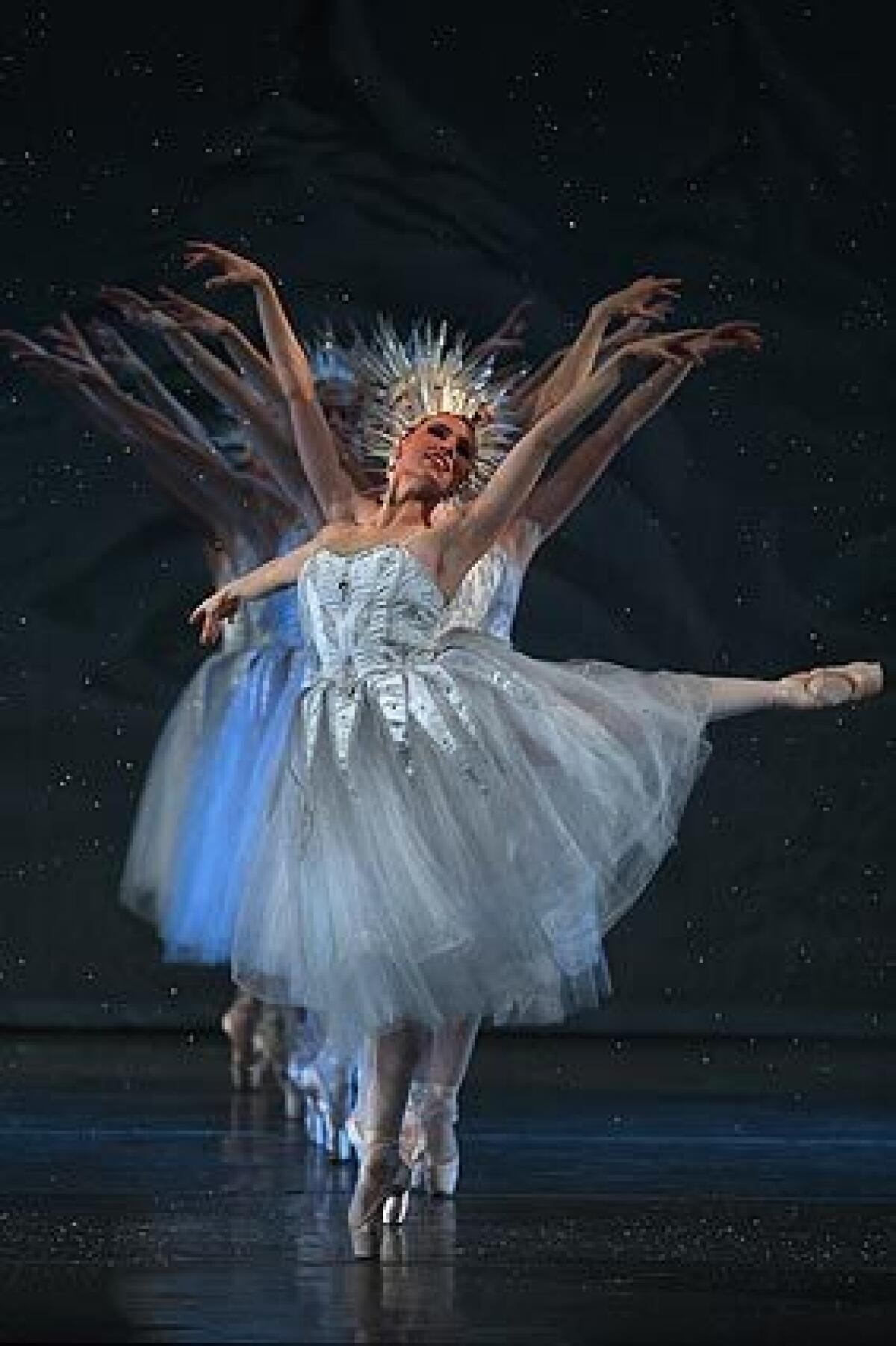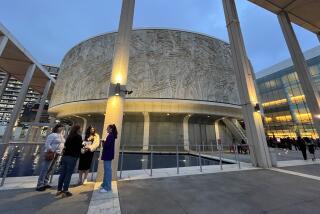L.A. misses its ‘Nutcracker’ and ‘Christmas Carol.’ How holiday show cancellations hit hard
“Bah, humbug!” It’s not a cliche; it’s a lifeline.
The words from Charles Dickens’ “A Christmas Carol” are worth their weight in counting-house gold to local theater companies this time of year. As is the graceful familiarity of “The Nutcracker.” The uplifting notes of Handel’s “Messiah” too.
These holiday touchstones aren’t lost just to audiences this year. They’re lost to small arts groups that rely on the bountiful revenue to refill depleted end-of-the-year coffers. But more than that, leaders said, these shows deliver so many intangibles — sowing company camaraderie, strengthening ties to core audiences and attracting new fans for the coming year.
“The production for us is a real community builder,” Julia Rodriguez-Elliott, co-artistic director of A Noise Within in Pasadena, said of her company’s annual “A Christmas Carol.” “We have patrons who come see the production year after year, and we get to be in the space together experiencing that beautiful story of redemption, which always feels necessary and often urgent.”
“A Christmas Carol,” she said, also introduces a lot of people to the theater. The audience that comes for Dickens’ classic tale of social justice and absolution is incredibly diverse, Rodriguez-Elliott said, and many go on to see other A Noise Within shows.
The company said “A Christmas Carol” has earned at least $175,000 in ticket revenue in each of the last three years, drawing nearly 7,000 audience members per season. It ranks as one of the company’s most popular shows with single-ticket buyers, accounting for about 12% of all ticket revenue.
Rodriguez-Elliott has directed the show for nearly a decade, ever since the company began staging it. Her husband and co-artistic director, Geoff Elliott, has played Scrooge the whole time. The show, Rodriguez-Elliott said, evolves each year according to what has been happening in the world. This year, had they been able to stage it, she imagines Christmas future might serve as a particularly dark cautionary tale.
A married couple also helms the annual “Christmas Carol” at Independent Shakespeare Company, which stages a two-person interpretation. ISC co-founder David Melville plays Dickens, and his wife, artistic director Melissa Chalsma, directs.
ISC is perhaps best known for its annual summer Griffith Park Free Shakespeare Festival. Melville said each year brings a pitched financial battle beginning in January and culminating with the summer festival, which, because it’s free, puts the company in the red every fall.
“Artistically we’re very satisfied,” Melville said. “But financially we’re defeated.”
“A Christmas Carol” usually brings a sigh of relief as the budget picture brightens.
“We know people are going to come, and it’s something that’s comfortable and easy to slip back into — just the joy of relaxing at the end of year into a piece of work that we’re familiar with and we love,” Melville said. “There’s always such a feeling of celebration about doing it.”
On a good year, Melville said, ISC’s operating budget is around $750,000, and “A Christmas Carol” brings in about $35,000. But even that loss — about 5% of the budget — hits hard, Chalsma said.
“As long as we can perform during the summer in 2021, we’re going to be OK,” she says, referring to both budget vagaries and questions about how quickly coronavirus vaccinations can return a semblance of normalcy to everyday life. “But will we be able to perform then? We don’t know.”
In the meantime, ISC is doing its best to satiate its audience’s holiday appetite by presenting “Twelve Days of Dickens,” bits that include podcasts and guest videos, delivered digitally each day beginning Monday.
The endeavor won’t come close to raising the money that a live show would, Chalsma said, but “hopefully we will be able to stay connected and get some of those good feelings back.”
Good feelings also drive Los Angeles Master Chorale each year when it presents four holiday shows, including Handel’s Messiah and a Messiah sing-along.
“Nobody does Christmas like a choir,” said the group’s president and CEO, Jean Davidson, adding that the loss of those live concerts “definitely puts a big hole in our plans, but we’re pivoting like everyone else.”
Davidson said the master chorale, which last year had an annual budget of $8 million, generally makes about $1.5 million from ticket sales and subscriptions. Holiday concert sales, she said, represent 42% of that income.
This year LAMC is presenting a digital program, “Holiday Karaoke,” which Davidson said was the brainchild of LAMC’s new associate artistic director, Jenny Wong. It will launch Dec. 17 and feature a full-length live-streamed concert and sing-along.
That program, however, is free. Davidson said competing in the digital universe of offerings unleashed by pandemic closures has been a challenge, but the master chorale has learned a great deal in the process, attracting a previously unimaginable global audience. Some streaming performances have reached 100,000 viewers in a couple of weeks, she said, whereas normally they are seen by about 25,000 people a year.
“It’s more about reach than money,” Davidson said.
She is immensely grateful for individual donors and philanthropic organizations that have covered this year’s entire $3.2-million operating budget.
“I think we have a great sense of hope, and a pretty positive forward-looking crew here,” Davidson said. “On the flip side, we are a very social organization, and it’s a very communal culture, so it has been very difficult to be so separated.”
The same can be said of the local dance community as it grapples with the loss of “The Nutcracker.”
Inland Pacific Ballet began its annual production in 1995. The show grew from a weekend of performances in a single theater to a regional tour spread over four theaters — with performances beginning around Thanksgiving and ending just before Christmas. Last year about 9,000 people saw the production, generating $400,000 in ticket sales — or 62% of Inland Pacific Ballet’s total revenue for 2019.
Which is why losing the holiday show is “a huge, huge blow,” said artistic director Victoria Koenig. The loss hurts not only the group’s current budget but also future audience development. “We have probably 30,000 to 35,000 names of people who’ve signed up to be on our mailing list from shows,” she said.

Los Angeles Ballet debuted as a company with “The Nutcracker” in 2006, and the production grew to become a regional tour performed in five venues, including the Dolby Theatre in Hollywood.
Co-artistic director Thordal Christensen said the company, whose operating budget is less than $4 million, brought in about $1.5 million last year with “The Nutcracker.”
“This is the big moneymaker, the one that carries us through the end of the year and into next year,” Christensen said. This is the one production that American companies really grow on and survive on.”
The absence of “The Nutcracker” is particularly hard for the company’s 35 dancers, who have had to put their careers on sudden hold during the pandemic.
“It’s difficult for them. They’re young dancers,” Christensen said. “Ballet is a short career. You have a certain amount of years; all of a sudden you’re losing a full year. That has an impact.”
To offset the COVID cancellation, L.A. Ballet is selling tickets for “Clara’s Nutcracker Tea Party,” an interactive, virtual event featuring excerpts from previous performances.
Dancers are feeling a keen loss at American Contemporary Ballet, which debuted its intimate and immersive “The Nutcracker Suite” in 2017. The production has grown from 12 shows in 2017 to what would have been 30 shows this year, and it represents 45% of ticket revenue for a season that runs from October through August.
“They’ve probably done ‘Nutcracker’ in some form or another since they were little kids,” company artistic director Lincoln Jones said of the dancers. “Probably being the bunnies and the soldiers in a normal ‘Nutcracker’ and then growing up into it. So I think it’s driving home the fact that they’re not able to dance a little bit more acutely.”
More to Read
The biggest entertainment stories
Get our big stories about Hollywood, film, television, music, arts, culture and more right in your inbox as soon as they publish.
You may occasionally receive promotional content from the Los Angeles Times.












